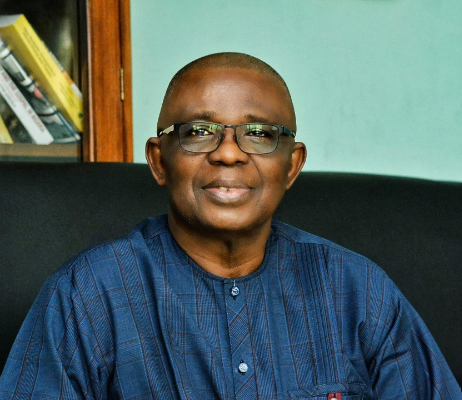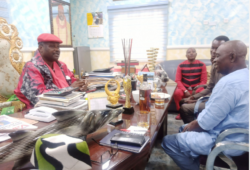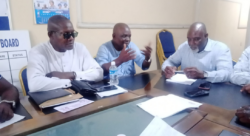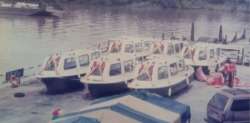Theatre for Development in the Niger Delta: Interview with Professor Austin Asagba

My name is Professor Austin Asagba and I am an intellectual and scholar specialising in Drama and Theatre, Development Theatre / Communication Studies, Culture and Performance Studies, with a specialist interest in African Theatre and Literature. I have been involved in the teaching and supervising of drama and theatre student projects at both undergraduate and postgraduate levels all through my working career. Aside from my academic and research commitments at the University of Benin, Nigeria, I have worked across communities in Nigeria and in the international sphere, using TfD as a tool and strategy for the facilitation of enlightenment, and development processes in the communities. I have worked in partnership with NGOs and international partners such as Carter Foundation, Cuso (Canadian University Services Overseas), and Polio Plus. I am also a creative poet, and short story writer. In my spare time I enjoy playing tennis and travelling.
What project have you worked on during your fellowship period?
My study was a three-month interrogation of the use of TfD by Non-Governmental Agencies (NGOs), oil multinational companies, and the attendant problems and challenges associated with this method, in this particular volatile oil rich region of Nigeria. Specifically, the work focused on the Forcados-Yorkri communities located in the Ogulagha clan from 1998 to the present. The Ogulagha clan is mainly an Ijō speaking group of communities and the area contains the largest oil reserve in Nigeria. Most of Nigeria’s exported oil is through the Forcados terminal located in the Ogulagha community, highlighting the significance of this clan. From the scope and geographical spread of the work, my study was a rather ambitious project, however I am confident that with adequate funding and support, the study could provide materials and information for future work in the area, especially in the use of TfD for development communication.
The project involved the examination and assessment of the impact of the community development tools, used by Shell Petroleum Development Company (SPDC), Chevron, Total- Elf and their joint venture partner, the Nigeria National Petroleum Company (NNPC) which represents the interest of the Nigerian Government, against the backdrop of the United Nations Charter on Sustainable Growth and Development in marginalised and oppressed communities, where natural resources like oil are abundantly produced, explored and exploited.
What are the findings of your project so far?
The study raised a lot of questions regarding the use of TfD, and culture, in the mobilisation and facilitation of sustainable development projects in a marginalised, oppressed and exploited area, such as the FYIP communities in the Niger Delta region of Nigeria. An important question is whether the projects and programmes, facilitated by TfD and funded by the oil multinationals have brought the much needed social, economic and political changes for sustainable development in the communities.
Following the field visits and the analysis of the formal interviews and feedback from community leaders, representatives, operatives of the multinational oil companies, community theatre amateurs and facilitators, generalised research findings are detailed below:
Community leaders and representatives were clear on their general dissatisfaction with the policies and modus operandi of the oil companies. The role of the federal government was adversely implicated, especially the failure to provide security, and  an enabling environment for the people and communities to benefit fully from the oil resources and wealth within their local vicinity. Some of the TfD projects have been abandoned by the community, in some cases this is due to lack of consultation with community. Critical issues of trust, credibility and poor communication between the oil companies and communities were central and consistent in the feedback arising from the conversations and interviews with community leaders and representatives. Frustration was also apparent and they expressed their feelings that social transformation is slow and the communities are still plagued by poverty, poor health facilities, environmental challenges and many more.
an enabling environment for the people and communities to benefit fully from the oil resources and wealth within their local vicinity. Some of the TfD projects have been abandoned by the community, in some cases this is due to lack of consultation with community. Critical issues of trust, credibility and poor communication between the oil companies and communities were central and consistent in the feedback arising from the conversations and interviews with community leaders and representatives. Frustration was also apparent and they expressed their feelings that social transformation is slow and the communities are still plagued by poverty, poor health facilities, environmental challenges and many more.
With proper and sustained research, commitment and funding, the research could provide enduring links for future collaborative work between the Universities of Benin and Leeds, especially in the areas of Junior academic staff training.
How does the project speak to the overall theme of “African knowledges for global challenges”?
TfD is a United Nations approved technique and strategy, for the mobilisation and development of oppressed people, in the rural and marginalised communities, such as the FYIP communities located in the Niger Delta region of Nigeria. The method has been used globally, especially in Africa, to address issues of poverty, hunger, discrimination, gender inequality, climatic and environmental issues, etc. In practice, it draws immensely, from the local cultural repertoire of the people, as it seeks to make the people do things for themselves, collectively and in a participatory manner. The end goal is to create ideas and  participate in development community projects that are sustainable and beneficial to the people, now and tomorrow. The present research brings to the fore, the need for proper communication channels, effective prioritisation of community needs and empathy with the environmental challenges of the FYIP communities, in order to achieve sustainable development. Through the use of TfD, in these communities, the key issues of poverty, gender inequality, marginalisation and oppression are being gradually addressed and ameliorated. What is key is that the method is cheap, simple and well rooted in the traditions of the people. This therefore means that the whole process, and the anticipated end goal, is rooted and anchored in African knowledge – the exploration and utilisation of the rich cultural repertoire of the people, as they seek to achieve social and political development.
participate in development community projects that are sustainable and beneficial to the people, now and tomorrow. The present research brings to the fore, the need for proper communication channels, effective prioritisation of community needs and empathy with the environmental challenges of the FYIP communities, in order to achieve sustainable development. Through the use of TfD, in these communities, the key issues of poverty, gender inequality, marginalisation and oppression are being gradually addressed and ameliorated. What is key is that the method is cheap, simple and well rooted in the traditions of the people. This therefore means that the whole process, and the anticipated end goal, is rooted and anchored in African knowledge – the exploration and utilisation of the rich cultural repertoire of the people, as they seek to achieve social and political development.
Is there anything you would like to add?
I am immensely grateful to the University of Leeds and the organisers of the LUCAS/LAHRI visiting fellowship scheme for supporting this research project. It has been an evolutionary experience thus far for the marginalised FYIP community in the  Niger Delta region of Nigeria, and in the progression of TfD as a globally accepted tool for working in marginalised, oppressed and exploited rural communities in Africa. The aim is that TfD as a tool evolves in the capacity of its usage in even broader communities, urban and rural, and for different purposes worldwide.
Niger Delta region of Nigeria, and in the progression of TfD as a globally accepted tool for working in marginalised, oppressed and exploited rural communities in Africa. The aim is that TfD as a tool evolves in the capacity of its usage in even broader communities, urban and rural, and for different purposes worldwide.
Image 1 and 2: Austin with key stakeholders of the host communities (the Royal Father, Chiefs, and youth groups) in the Forcados area located in the Ogulagha Kingdom of the Niger Delta region.
Image 3: Six Boats that were handed to the Ogulagha Community as part of earlier work.
